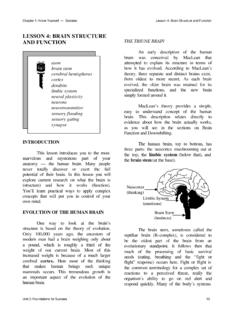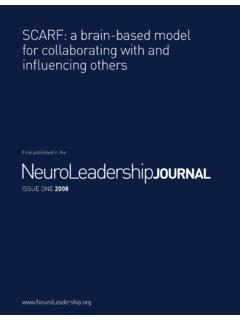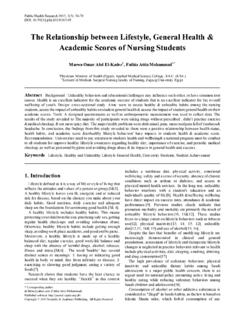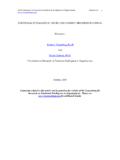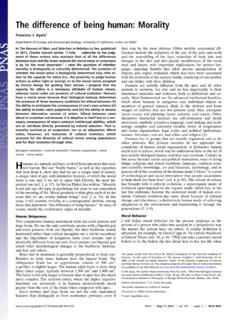Transcription of The Healthy Mind Platter - Dr. David Rock
1 The Healthy mind Platter David Rock, Daniel J. Siegel, Steven Poelmans and Jessica Payne This article was published in the NeuroLeadershipjournal issue FOUR. The attached copy is furnished to the author for non-commercial research and education use, including for instruction at the author's institution, sharing with colleagues and providing to institutional administration. Other uses, including reproduction and distribution, or selling or licensing copies, or posting to personal, institutional or third- party websites are prohibited. In most cases authors are permitted to post a version of the article to their personal website or institutional repository.
2 Authors requiring further information regarding the NeuroLeadership Journal's archiving and management policies are encouraged to send inquiries to: The NeuroLeadership Journal is for non-commercial research and education use only. Other uses, including reproduction and distribution, or selling or licensing copies, or posting to personal, institutional or third-party websites are prohibited. NeuroLeadership Institute 2012 For Permissions, email In most cases authors are permitted to post a version of the article to their personal website or institutional repository.
3 Authors requiring further information regarding the NeuroLeadership Journal's archiving and management policies are encouraged to send inquiries to: The views, opinions, conjectures, and conclusions provided by the authors of the articles in the NeuroLeadership Journal may not express the positions taken by the NeuroLeadership Journal, the NeuroLeadership Institute, the Institute's Board of Advisors, or the various constituencies with which the Institute works or otherwise affiliates or cooperates. It is a basic tenant of both the NeuroLeadership Institute and the NeuroLeadership Journal to encourage and stimulate creative thought and discourse in the emerging field of NeuroLeadership.
4 NeuroLeadership Journal (ISSN 2200-8535) Issue Four published in October 2012. We encourage readers to propose a paper for the next edition of this Journal. We recommend sending in a two-page proposal before submitting a finished paper and welcome pure science, as well as case studies and discussion pieces. For further information as to how to submit a paper for the next Journal go to RESEARCH. The Healthy mind Platter David Rock, Daniel J. Siegel, Steven Poelmans and Jessica Payne David Rock, CEO, NeuroLeadership Group, New York Faculty, CIMBA.
5 Co-founder, NeuroLeadership Institute: Co-Editor, NeuroLeadership Journal Daniel J. Siegel, Mindsight Institute, Los Angeles; UCLA: Center for Culture, Brain, and Development, Mindful Awareness Research Center, Clinical Professor, School of Medicine Steven Poelmans, EADA Business School; Coaching Competency Center Jessica Payne, University of Notre Dame The last few decades have witnessed a growing these activities makes a unique and positive contribution awareness of the importance of nutrition as a basis to mental productivity and wellbeing.
6 As such, the objective for health within the general population. In the of the Healthy mind Platter is to propose a framework for and Europe, governments have created nutrition creating and maintaining mental well-being, summarizing and recommendations. Published as charts, such as Healthy integrating distinct strands of neuroscience and psychology food pyramids, which indicate that different food groups research, so it can be used to inform communities such as provide important nutrients, they recommend that schools, organizations, governments, and communities, as well citizens follow a complete diet that provides all the as families and individuals, about best practices for promoting essentials the body needs.
7 Because the body needs a mental health. wide variety of ingredients for optimal health, the basic underlying principles are variation and complementarity. Introduction This suggests that always eating the same food, even if it Throughout the world, driven by advances in information is Healthy , does not provide the body with a wide enough technology and automation, our economy is gradually variety of ingredients for optimal health. shifting to a knowledge- and service-driven economy, where Spurred on in 2011 by the Government's relaunch of the increasingly the basic production factor of muscle power is NeuroLeadership Institute 2012 For Permissions, email food pyramid as a Healthy eating plate', the authors Daniel being replaced by brain-power.
8 Although often compared to a Siegel and David Rock decided to explore a framework for muscle, the brain's anatomy and physiology is fundamentally understanding the ideal diet for our brain. We decided to coin different from those of muscles. Whereas a combination this the Healthy mind Platter . We do not refer literally to of exercise, rest and nutrition can be sufficient to produce substances like glucose, which is an essential nutrient for the physical strength and resilience, these are clearly not functioning of the brain, but to a set of everyday activities that sufficient conditions for an alert, creative and resilient mind .
9 On the whole, optimize brain health . Based on our literature In line with the principles and purpose of positive psychology, review, we hypothesize that there are seven activities that we want to move beyond studying and summarizing what each have different and beneficial effects on the mind that is needed to avoid pathology, and make clear and useful complement each other, providing together a well-balanced what is needed to promote health. Though awareness of mental diet for optimal neurocognitive functioning and how an unhealthy diet can result in serious pathologies and well-being.
10 We propose that very much as in the case of epidemics, like obesity, is now being raised, many are hardly food, people can do without some of these activities, but this aware of the costs of an unhealthy mental diet, like massive lack of behavior will be associated with sub-optimal levels losses in productivity, exhaustion, burn-out, and stress. of functioning or ill-health. Further research is needed to Explicating the constituent activities for a Healthy mind is determine the exact quantity and quality of each activity that therefore timely and important, especially since developed is needed for optimal health, but we propose that each of countries are reaching the limits of economic growth.

